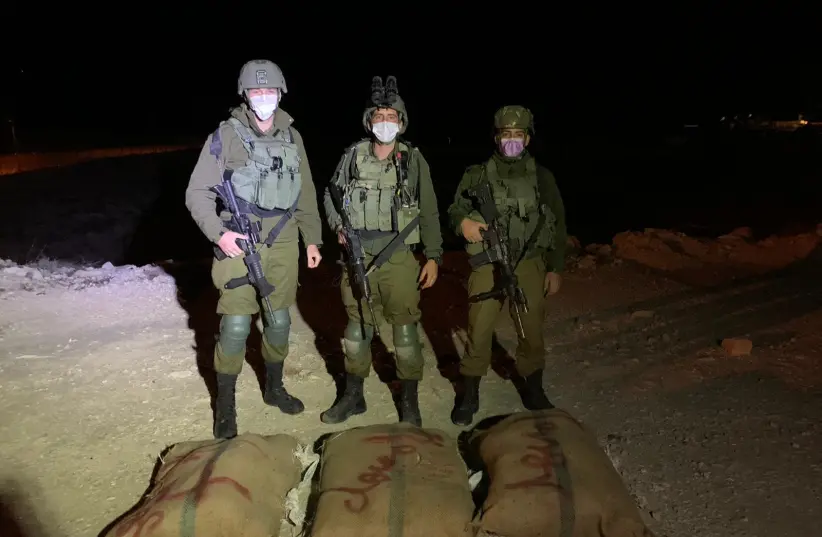IDF officials link the success in thwarting drug smuggling through the Egyptian border to the rise of crime in the Bedouin sector inside Israel
While the borders with Lebanon, Syria and Gaza make most of the headlines, the actual border with the most action seems to be the one with Egypt.
The soldiers protecting the border have to deal with two main threats: the terrorist threat, which usually focuses on Wilayat Sina’ (the Sinai District), an organization affiliated with ISIS; and the criminal threat, which usually takes the form of drug smuggling.
The latter might seem to be less dangerous, but a senior source in the border protection apparatus told The Jerusalem Post these events, which happen on a regular basis, tend to develop into live-fire incidents.
“Our commanders and soldiers are experienced in live-fire incidents more than any other front,” the source said. “Once a week, during a smuggling attempt, they [the smugglers] shoot all over, and commanders and combat soldiers have felt here the bullets hovering near their heads.”
The units protecting the border made a significant change in recent years in the way they deal with smuggling, the source said.
“We have managed to cut down a large percentage of the smuggling in recent years,” he said. “Because of our success, we see a rise in the phenomenon that we dub as ‘violent smuggling.’ In these incidents, the smugglers are using live fire. In most cases, they aim at the Egyptian police officers near the border, and in some cases, we see a slip of fire into Israel.”
There was an 11% decrease in drug-smuggling attempts through the Egyptian border last year, according to the IDF. Smuggling attempts were thwarted 57 times, compared with 34 times in 2019, it said.
The Paran Regional Brigade is in charge of protecting the Egyptian border from the southern Gaza Strip to Eilat.
In recent years, the brigade, composed of two coed battalions, Caracal and Bardelas, focused on improving its methods against this phenomenon. The two main efforts focused on quickly reaching a point in which there is a smuggling attempt and establishing a mechanism in which the IDF, the Israel Police and the Israel Nature and Parks Authority cooperate.
“One of our focuses was on improving the intelligence in the region,” a senior source in the Paran Regional Brigade told the Post. “It helped us build an ability to reach an event quickly.”
“This shortened the time that a smuggling event takes,” he said. “If back in the past a smuggling event lasted something like 20 minutes until an IDF patrol arrived, and during which they managed to smuggle some 40 bags, now we reach them in three minutes, and the most they can [move] is three bags.”
In 2019, some 70 tons of drugs were smuggled through the Egyptian border, and there was an average of 11 bags in a smuggling event, according to the IDF.
In 2020, the number dropped to 33 tons, and there was an average of 5.8 bags per smuggling event.
In terms of cooperation, after years that the responsibility to deal with the smuggling fell between the cracks, the brigade took the initiative and set up a mechanism that involves all the relevant parties, the source said.
“We set up a war room that assembled all of the bodies that need to be involved, like the police, the Israel Nature and Parks Authority and special intelligence units,” he said. “Now, we know much more about smugglers on both sides of the fence. This war room creates intelligence on a daily basis, and then we know where to focus and where a smuggling event will take place.”
Another step the brigade took was rearranging its forces along the border. In the populated areas, such as Bnei Netzarim and Nitzana, and other places that were defined as “valuable assets,” the brigade located a permanent force with “high lethality.”
“In these places our forces have, among other things, infantry units and tanks,“ the source said. “We have them there so we will have an available and accessible force in case of an emergency. In the rest of the front, which is mostly unpopulated desert mountains, I work according to our precise intelligence.”
However, the success of the regional brigade does not come without a price. Cutting down the drug cartels in the South also cuts down the income of hundreds of families, which was steady for many years, and Bedouin families look for other ways to make money, according to the IDF.
“We hit them on one side, so they’re looking for another,” the source said. “We see that loss of income being ‘compensated’ in other fields, like breaking into [IDF] bases and attempting to steal weapons and ammunition.”
“This is a wide phenomenon, and solving it requires a national operation,” he said. “We need the entire system to focus on investing in the Bedouin society… in education and in creating jobs. This [the smuggling] is a widespread phenomenon, and it requires a holistic, wider and deeper solution, which also includes sovereignty in the South.”
 Eurasia Press & News
Eurasia Press & News


